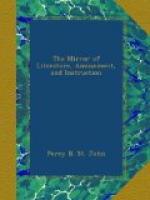Your ministers, soaring,
May shun all the boring
Of country and city baboon—
Or, like ministers’
spouses,
Look down on both Houses—
From the car of the air-balloon.
The sweet six months’
widow
Her weeds will abide, O,
No longer, nor cry “’Tis too
soon!”
But range the skies over,
In search of a lover,
In the car of the air balloon.
If you wish for a singe-a
In Afric or India,
Or long for an Esquimaux’ tune,
Or wish to go snacks
With the king of the blacks,—
Why,—call for your air-balloon.
If, on Teneriffe’s Peak,
You’d wish for a steak,
Or dip in Vesuvius your spoon,
Or slip all the dog-days,
The rain-days, and fog-days,—
Go, call for your air-balloon.
Your doctors of physic
May banish the phthisic.
Your cook give you ice-creams in June—
If a dun’s in the wind,
You may leave him behind,
And be off in your air-balloon.
On the top of the Andes,
Who’s tortur’d
with dandies?
On Potosi, who meets a buffoon?
But, for fear I’d get
prosy,
I’ll stop at Potosi,—
So, huzza for the air-balloon!
Monthly Magazine.
* * * * *
ALVISE SANUTO.
A Venetian Story[7]
[7] The nobility of Venice
were subject to the most rigorous
surveillance,
and dearly paid, occasionally, for the small
degree
of power conceded by the ducal house. The jealousy
of
the
government with regard to these men was carried to
excess.
I
may mention three regulations among the many that related
to
them,
as illustrative of the galling yoke that pressed on
them,
amid
all their pride and splendour. The first forbade
them to
leave
the dominions of the state without the special permission
of
the council of ten; and this was granted with difficulty.
The
second prohibited them from possessing foods and chattels
out
of the state. This was with a view of preventing
the danger
that
might arise from attempts to betray the republic under
an
idea
of finding an asylum elsewhere. The third and
most severe
decree
forbade communication with foreign ambassadors, under
pain
of death! The terror inspired by this was such,
that not
only
the ministers of the court, but their secretaries and
domestics,
fled from the ambassadors as if they were infected
with
the plague. This decree had numerous results,
and among
others,
one that was attended with truly tragical circumstances.
Alvise Sanuto was a young man of whom his country entertained the proudest hopes. His courage had been gloriously tried in the battle of Lepanto, in which he had performed prodigies of valour. His prudence and foresight had been often the subject of admiration in the great council of the state. The old man, his father, esteemed him as the ornament and grace of his family: Venice pointed to him as one of her best citizens. Alvise was destined to fall by an infamous death.




